| |
|

FRIDAY-SUNDAY, JULY 4-6


FRIDAY, JULY 18 Temple Solel Shabbat at Beach


MON., SEPT. 29-THURS., OCT. 9


LETTER FROM JERUSALEM
Israel's painful deal with Hizbollah
By Ira Sharkansky
 JERUSALEM, June 30—The government has completed one decision with high emotional costs, and it is coming up to another that will be even more difficult. JERUSALEM, June 30—The government has completed one decision with high emotional costs, and it is coming up to another that will be even more difficult.
It has decided to accept a deal with Hizbollah. Israel will release a terrorist responsible for the deaths in 1979 of two young children, their father and another adult, as well as some Hizbollah fighters captured during the fighting in 2006, several dead bodies and an unknown number of Palestinians. In exchange, Israel will receive what is likely to be the bodies of two Israeli soldiers captured in 2006, and some information about an airman who parachuted into Lebanon in 1986, and subsequently disappeared.
Only 3 of 25 ministers voted against the deal. The others raised their hands for what many thought was a bad deal. Most likely, it was the only way of confirming the death of the soldiers, obtaining their bodies for the sake of the families, and freeing a young widow from the status of an agunah who cannot remarry.
Still at work are negotiations for the release of Gilad Shalit, a soldier known to be alive, who was taken into Gaza two years ago. His captors are demanding the release of about 1000 prisoners, including a number sentenced to multiple life sentences for attacks that killed Israeli civilians.
Similar to the campaign in favor of the men who disappeared into Lebanon, Shalit's family members, his friends, comrades in his army unit, and an increasing swath of the general public are demanding that the government pay "any price" for his release.
It will be hard not to. We frequently hear about how many days Shalit has been held captive, unhealthy conditions of his confinement underground without sunlight, as well as his deteriorating condition.
Numerous military and political figures have spoken out against the price that Hamas is demanding. The problem is not so much the number of prisoners, but the nature of the crimes committed, the number of victims, the short time they have served in prison, and the likelihood that many will return to a career of violence against Jews.
The Lebanese terrorist about to be freed served more than 25 years in Israeli prison. The widow and mother of his victims appeared in public prior to the government's decision. In a statement that was painful to hear, she urged that the government accept the deal for the sake of the soldiers' widow and other family members.
In the case of killers who may be released for Shalit, hundreds of victims' families will demand to be heard.
Among the sources of anger about both of these cases is the silence of official bodies, "civil rights" organizations, Israeli and others, as well as Christian Churches that complain loudly about Israeli actions in every forum attainable. None has mounted a sustained campaign against the Palestinian and Lebanese who have prevented all contact with the prisoners by the Red Cross or other organizations. United Nations Security Council Resolution 1701, that ended the fighting in Lebanon, demanded that Hizbollah return its prisoners immediately. It has bickered on and off for two years about their release, and still has not indicated whether they are alive or dead.
There is no shortage of suggestions as to how to pressure the people who are demanding so much for the release of Shalit. They include cutting off supplies of food, fuel, electricity, and other necessities to Gaza, and an artillery response for every rocket or mortar shell sent toward an Israeli settlement, perhaps with a prior warning for civilians to leave the areas in Gaza to be targeted.
Such suggestions invite ridicule from Israelis who call themselves realists. The humanitarians of Israel and elsewhere, plus the United Nations, other governments, and Christian Churches that tolerated the inhumane treatment of Israelis by Palestinians and Lebanese would find their voices. They will pass resolutions about the indiscriminate harm to innocent civilians, and threaten international sanctions. Within hours there will be petitions to the Israeli Supreme Court. If the justices' record to date is any indication of how they will rule, they will outlaw anything that threatens the civilians of Gaza.
It will not be clear for some time what the government will decide about Gilad Shalit. Whatever happens, it will not be pleasant.


What the devil is O.C.S.? or how
to end importing Middle East oil
By J. Zel Lurie
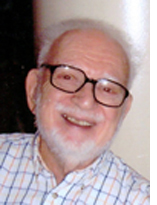 DELRAY BEACH, Florida, June 25—On a Wednesday morning a couple of weeks ago I tuned in to CNN and found to my surprise that our lame-duck President was making a major policy address. DELRAY BEACH, Florida, June 25—On a Wednesday morning a couple of weeks ago I tuned in to CNN and found to my surprise that our lame-duck President was making a major policy address.
Without any advance warning, he was calling on Congress to take action on something he called O.C.S. before the Fourth of July recess.
Since I had tuned in at the close of his speech I had no idea what O.C.S was.
The headlines the next day informed me that our President was giving Congress three weeks, until the Fourth of July recess, to eliminate the restrictions placed by Jimmy Carter in 1981 on exploring for oil and gas in the offshore continental shelf. That is the O.C.S. the president was talking about.
Barack Obama immediately opposed it. John McCain supported the President.
In the following days I found a full page ad in Time Magazine and the New York Times signed by the oil and gas industry which had a curious box on the edge of the ad. . It said that 85% of O.C.S. “was off limits to oil and natural gas development.”
No explanation anywhere in the ad what O.C.S. stood for.
It was obvious, however, that the oil and gas industry was using our president and the $4 a gallon price of fuel to generate public opinion for removing the restrictions on drilling on the continental shelf and stockpile leases for future exploration, way into the future.
Two years ago our president had promised to search for a cure to our addiction to oil.
It is easy to attack the President and his oily friends and their obscene profits. Exxon-Mobile alone had an annual profit of $40 billion. That is greater than the gross national product of most of the members of the United Nations.
It is also obvious that the oil and gas industry would like to get the blanket restriction on drilling off the coast removed while their pals Bush and Cheney are still in the White house.
Remove the restrictions
The Obama campaign is correct. Sixty-eight million acres leased by the oil companies under previous administrations are not being used. Obama supports a Democratic bill which would charge an annual fee until drilling begins. “Use it or lose it” is the Democratic slogan.
Under the same slogan, the restrictions on O.C.S. can be removed and sparring can be stopped with the McCain and the state governors who support the move. Leases can be offered which would expire in two years unless they are utilized to produce oil or natural gas. I doubt there will be many takers and the issue will be solved.
Obama hasn’t mentioned oil sands and shale rock. According to the Institute for Energy Research there are two trillion barrels of oil trapped in sand and shale in North America. This is seven times the oil reserve in Saudi Arabia.
Follow Brazil’s example
John McCain is correct in his praise of Brazil. That country has learned to combine the two opposites: dependence on oil while developing alternative sources.
On the verge of bankruptcy a decade ago, Brazil is now a powerful petro-power. It has developed a large oil basin 145 miles offshore.
At the same time it has utilized sugar to produce alternative fuel.
Sugar is five times superior to corn-based ethanol, which Obama favors. Sugar gives you eight units of energy for every unit consumed in making it. Ethanol, which has driven up the cost of corn and caused food shortages all over the world, produces less than two units of energy for every unit used in making it.
The largest manufacturer of ethanol is the agribusiness giant Archer Daniels Midland which is based in Illinois. A.D.M.’s lobbyists have pushed through Congress a subsidy for ethanol and a tariff on fuel from sugar. The Senator from Illinois has supported both the subsidy, which has lined the big pockets of A.D.M. and the tariff on Brazilian sugar fuel. Both should be eliminated.
Brazil has also decreed that 70 percent of the cars manufactured should run on alternative fuel. This is an excellent example for Detroit to follow.
Am I doing the environmentalists a disservice by recommending that offshore restrictions be removed. I don’t think so.
Florida Governor Charlie Crist supports his president on removing the restrictions. . Bathers on the pristine Palm Beaches have visions of oil derricks lining the horizon. They are wrong. Brazil discovered oil 145 miles offshore. No one on shore can see that far.
As far as oil spills are concerned, Katrina proved their fears unfounded. Many oil platforms in the Gulf were wrecked but not a drop of oil polluted the water. The same cannot be said of the oil tankers in New Orleans harbor.
The United States consumes a quarter of the world’s oil production and 97 percent is imported. The tankers lose oil and we are flooding the Middle East with petro dollars. Some of which fall into the hands of Al Qaeda.
We can become self-sufficient in a couple of decades by utilizing all our oil resources and developing alternative fuels and cars. Wouldn’t that be wonderful!
From the point of view of Jewish tradition, viewed in the abstract, they had a case. Judaism forbids humans to play God, however urgent the cause. Life, it's argued, is qualitative not quantitative – you're either alive or you're dead. Therefore, it's improper to assert, as the doctors at the Grace Hospital in Winnipeg seem to have done, that as Golubchuk only had minimal brain functions with no prospect of recovery, treatment should be discontinued, even though in some sense he was still alive.
His death last week while on life support has removed reported tensions at the hospital, where some doctors threatened to leave in frustration. However, the larger issue remains relevant.
In a recent radio interview, Dr. James Orbinsky, one of Canada's great humanitarians, said that when he began work with Doctors Without Borders, he found himself in an African country, one of many where the organization has been saving lives. Standing outside the medical tent, he saw movement in the adjacent tent set aside as a morgue. When he went to investigate, he discovered a man alive on top of a heap of bodies.
Those who worked in the medical tent were angry that he brought the man for treatment. They argued that as he would die soon, it was a waste of resources to look after him. Were the doctors in Winnipeg of similar mind?
As an advocate of the rights of the disabled, I know that this may have been the case. An ostensibly prudent attitude may herald the beginning of a slippery slope that would allow authorities to determine that those too costly to treat or too cumbersome to handle should be put out to die. Fearing state-sponsored euthanasia under another name, my friend applauded the judge who ordered the Winnipeg hospital to continue treatment.
Over the years, I've been with several families that had to take decisions about a loved one on life support. It was always traumatic. Though the general principle should be open to public debate, each individual case must be judged on its own merits.
A decision always requires unanimity among all members of the immediate family and an honest attempt to answer the painful question of whether keeping the patient on life support was in the best interest, and according to expressed wishes, of the patient, or for the comfort of the family unable to face a loved one's death.
In my experience, most families concluded that they were more concerned about themselves than about the patient. I hope that the Golubchuk family was engaged in similar self-scrutiny. The process is usually more authentic than citing religious beliefs. In most cases, medical opinion and religious convictions need not contradict each other. Recently, Orthodox rabbis in Israel have determined that medically determined brain death be regarded as the end of life.
Turning cases like that of Samuel Golubchuk's into battles between science and religion to be adjudicated by law is a poor way of dealing with a human problem of immense consequences not only for the distressed family but also for society at large.




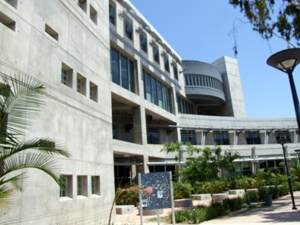 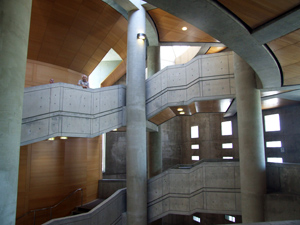
THE JEWISH CITIZEN
San Diego Mesa College librarian Jack Forman a connoisseur of Jewish books
By Donald H. Harrison
 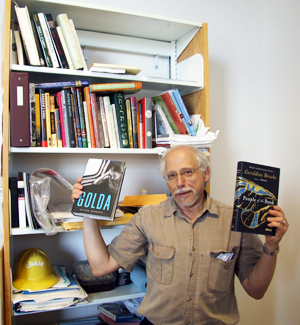 SAN DIEGO, June 30—On the book shelves of librarian Jack Forman’s office at San Diego Mesa College are many Jewish stories, two of which he is holding up in the adjacent photograph. Forman serves on the American Library Association’s panel that awards the Sophie Brody Medal for the best Jewish book of the year. Named for a late San Diego philanthropist, the award is funded by her husband Arthur Brody and the Broadart Foundation. Forman and eight other librarians throughout the United States are members of the committee. Their chair is Barbara Bibel, an Oakland librarian. SAN DIEGO, June 30—On the book shelves of librarian Jack Forman’s office at San Diego Mesa College are many Jewish stories, two of which he is holding up in the adjacent photograph. Forman serves on the American Library Association’s panel that awards the Sophie Brody Medal for the best Jewish book of the year. Named for a late San Diego philanthropist, the award is funded by her husband Arthur Brody and the Broadart Foundation. Forman and eight other librarians throughout the United States are members of the committee. Their chair is Barbara Bibel, an Oakland librarian.
Forman’s office sits near the library reference section of San Diego Mesa College’s ultramodern Learning Resource Center, which not only houses 110,000 hard cover books and 25,000 electronic books, but also is home to elaborate networks of computers and audio-visual equipment designed to teach junior college students the e-skills that are required for life in the 21st century.
The Learning Resource Center was designed by architect Mark I. Steele, who also designed Congregation Adat Yeshurun in La Jolla and is working on the proposed Hillel Center at UCSD. Aspects of the Learning Resource Center’s design appear to pay homage to the iconic architecture in La Jolla of the Salk Institute for Biological Studies, which was a collaboration by architect Louis I. Kahn and Jonas Salk, discover of the polio vaccine.
Besides evaluating the works of other writers, Forman is himself an author, having written the biography, Presenting Paul Zindel, about the author of numerous books for teenagers including Pig Man and My Darling, My Hamburger. Zindel also became well known to adults as the playwright of The Effect of Gamma Rays on Man-in-the-Moon Marigolds.
Forman said many of the teenagers and adults in Zindel‘s books were eccentric and that the author tried to teach teenagers that it is important to have self-esteem.
I asked Forman the criteria that he and other judges apply to determine the best Jewish book of the year. He responded that the winning entry must have Jewish “substance,” literary merit and “be accessible to the largest number of persons.”
Examining those criteria one-by-one, I learned that whereas there are numerous books that deal with Jews—such as Walter Isaacson’s Einstein: His Life and Universe, which Forman described as a
“wonderful biography”—the book focused on Einstein’s science rather than his Jewishness. Thus, it was not included in the list of books under consideration.
While literary merit may be a matter of perception, Forman said the book must be “something that reads well, and easily, and flows. It is well-organized, and it has a voice that you can connect to, not just a bunch of sentences. There must be some spirit or personality behind it.”
By accessible, Forman explained that a scholarly article on Judaism might be exceedingly well written, yet nevertheless not appeal to enough people to have much impact.
New winners won’t be announced until January, but one gets a sense of the committee’s standards in considering that Ministry of Special Cases by Nathan Englander was the most recent medalist. “Honor books” were Diane Ackerman’s The Zookeeper’s Wife; Joyce Antler’s You Never Call, You Never Write: A History of the Jewish Mother; and Shalom Auslander’s Foreskin’s Lament.
Forman said he receives for judging approximately 100 books each year, some of which are solicited and some of which are sent by publishers in the hope of attracting attention. He winnows the great stack of books by setting aside those which don’t hold his interest when he skims through them. Those rejected clearly are not up to the standards of the others. Balloting by the judges may further winnow the stack down to about 25 books, and these Forman said he will read cover to cover.
He is able to read some of his books in his office, notwithstanding his busy schedule as department chair of the library and audivisual department, and also teaching classes in library science, being responsible for ordering books in various categories, including religion; supervising the reference desk, and serving as an advisor to the Jewish Student Union, among other tasks.
Additionally Forman reads at the home that he shares with his wife, Gail Feinstein Forman, an occasional contributor to San Diego Jewish World (see her story below) and author of numerous books and stories for teaching English as a second language. I told him that I imagined that at their home he had a comfortable easy chair with a good reading light behind him, shining directly onto the pages of the book he’s reading. Actually, no, he responded, he usually reads on a couch, with a light at his side, that is “not really great lighting.” He’s been thinking of ordering a fine reading chair.
In San Diego Mesa College’s Learning Resource Center, there are a variety of reading configurations for the faculty and the students. The library has its own coffee shop, “where people can browse through a book,” he said. “We also have a small reading area off to the side, where we have new copies of magazines. On the second and third floors of the buildings, there are several study areas that are supposed to be quiet areas. There is a mixture of chairs at long tables and individual carrels where students can have more privacy, and 19 group study rooms where they can met as groups.”
Furthermore, he noted, “there are some easy chairs on the first floor and on the second floor, and students like them a lot. Unfortunately often they fall asleep in them. We get comments on the cards, on the one hand thanking us for the chairs, and on the other telling students to stop sleeping in them.”
The comment card program is taken quite seriously at San Diego Mesa College. The suggestions and the responses are posted conspicuously in the Learning Resource Center and together they make for some interesting reading.


JEWISH MEMORIES
Pop proudly gives a tour of his 'palace'
By Gail Feinstein Forman
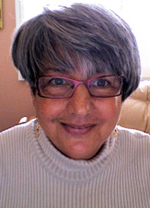 SAN DIEGO—The memories of my grandparents’ house and all that transpired there when I was a kid anchor me to the notion, rightly or wrongly, that I once experienced being part of an intact, complete, and happy family. That tiny bungalow in the urban-Jewish, Weequaic section of Newark, New Jersey – memorialized in Good Bye Columbus and subsequent Philip Roth books- framed for me the best memories of my childhood. SAN DIEGO—The memories of my grandparents’ house and all that transpired there when I was a kid anchor me to the notion, rightly or wrongly, that I once experienced being part of an intact, complete, and happy family. That tiny bungalow in the urban-Jewish, Weequaic section of Newark, New Jersey – memorialized in Good Bye Columbus and subsequent Philip Roth books- framed for me the best memories of my childhood.
The five-room house was gray and white stucco with five entry steps leading to the front door. It was situated next to an empty lot where my grandparents grew a small vegetable garden with cucumbers and tomatoes for pickling, corn, radishes and peas. One short block north was Chancellor Avenue, miracle row of Jewish delis and bakeries. And every weekend, from as early as I can remember, my younger brother, Mark, and I were carted off to spend Saturdays there.
An enormous world of possibilities opened up for my brother and me when we arrived there just from our good fortune of birth. My mother was the youngest of my grandparent’s three children, making my brother and I the “babies of the baby.”
In the hierarchy of Jewish grandchildren, my brother and I had been born into an exalted position. I learned very early on that if I obeyed just a few of my grandmother, “Mom’s”, “dasn’t do’ rules-“you dasn’t touch this” or” dasn’t do that”- I would have at my disposal, basically anything that I wanted.
After my grandparents greeted us, Mark and I were obliged to follow the weekly ritual of Pop’s “house tour.” Coming from a large family that farmed him out for butcher training so they would have one less mouth to feed, Pop was proud of all he had accomplished here in America. He was in “provisions” and a master of it. He had property, albeit a very small parcel. But he beamed with pride as our “House Tour” commenced.
Like a noble landowner, Pop pointed out what to him were the highlights of each room, - electric lights, wallpaper, air-conditioning, - exclaiming, ” It’s a miracle.” We shrugged and laughed because everything looked just the way it had looked the previous week when we did the same thing.
The living room was the first stop with plastic-covered 1940’s cushy furniture reserved mostly for company.” Now – collectible” lamps with crystals dangling from the top were set on several end tables. The room had low wide windows which kept the room light and airy, but hot in summer.
Pop never neglected to point out the striking photo of him and my grandmother,” looking like a doll,” on top of the TV. It was taken in Russia just after they were married. Being part of the deluge of Eastern European immigrants pouring into New York’s Ellis Island at the turn of the century, much of their personal history was buried as soon as they arrived. Yet in that photo, staring straight ahead, they are forever stately, reticent, strangely emotive-Manya, the dressmaker, and Sam,” the butcher, ready for what lies ahead on their courageous journey to this Goldene Medine (Golden land).
As far as any other furnishings were concerned, Pop’s giant, brown leather lounge chair dwarfed anything else in the room. Pop’s chair leaned at a 90% angle into the dining room, actually touching the dining room table, prime venue of family dramas writ large and small.
It was from that chair that one could hear Pop yelling back to the TV calling reviled politicians, such as Richard Nixon in particular, “monkey face” or bondeet, (thief). The interactions with his Yiddish daily newspaper, The Forward, were another story. He smacked his lips and let out a series of “Ay, Yi, Yi’s.” bemoaning the state of the world and the politics of the day.
The dining room came next on the tour. In the center of the dining room was a crystal bowl overflowing with mail, documents and paperwork to be taken care of or translated for my grandparents.
Next to the dining room table was the sofa where my grandmother sat holding a handkerchief and “kvetched “Oy” in rhythmic fashion numerous times a day. It’s also where I slept when I was an overnight visitor, which happened gleefully a few times a year.
Walk to the side of the sofa, and you were in “the sewing room,” the room totally off limits for kids where my grandmother met and sewed for her clients. My grandparents slept in the additional bedroom with “ I Love Lucy type” single beds.
Next to it was a small bathroom with black wallpaper with pink swans on it, then a small kitchen, all done in white Formica. Kids were served on the white Formica table, just an arm’s reach away from the steaming hot Russian borscht and sizzling matzah meal pancakes ready and waiting for us when we arrived.
After the kitchen, we’d head to the stairway, which led us to a primary focus of the tour itinerary-the basement. Unlike other parts of the tour, which were proclaimed “miracles”, just because they were there, the basement was pointed out to us for “ inspection.”
Arriving first at the bottom of the stairs, Pop turned to us and asked the weekly rhetorical question:
“Like a palace, no?”
It was far removed from the likes of either the Czar's Winter or Summer Palace because this ”palace” had a red-painted concrete floor, laundry machines and a storage closet for pickling jars.
“Sure, Pop! Like a palace!”
Pop walked us around the perimeter of the basement looking at the floor and how clean it was, again, “like a miracle.” We had to admire the washer and dryer and then go inside the storage closet to look with amazement at the amount of empty glass bottles they had managed to accumulate since the week before. But we knew it was worth it. Lunch and its’ rewards were coming soon!
Then we paraded on to the next and last stop on the tour, the backyard.
The backyard was truly a delight for the senses. It was a small yard, outlined by shrubs and fences, which separated the property from the back and side neighbors. In the center of the yard was a raised flowerbed, filled with multicolored rose bushes and enormous, bright red coxcombs that I have never seen anywhere else except in that yard. Pop loved to show us around the yard. We’d exaggerate all our “Ooohs” and “Ahhs” as we smelled all the flowers because that’s what he expected.
Strange, however though, in this delightful space, there was never a seat to be sat upon. Sitting happened nearby, where chairs were set up on the cement driveway. The garden, apparently, was set aside only for viewing and being viewed- most keenly by my Uncle Bill’s home movie camera.
Over a period of several years, Uncle Bill, my mother’s older brother, managed to snap every person in this family empire twirling, running, standing up, falling down, or waving -from steps, windows, driveways, and doorways- thus creating a dynamic legacy of the family frozen in time- accessible on film for whenever a return visit is needed.
It was in these films that my older cousin Judi and I- me, clumsy, reluctant, and always following Judi’s graceful lead- promenaded the new dance steps taught in Miss Greenwald’s Saturday dancing class.
After the tour, it was time for lunch. Kids were served in the kitchen by both my grandmother “Mum” and my grandfather, “Pop,” although each one had different roles. My grandmother would ladle out the hot steaming Russian borscht, and Pop would set out the rye bread and rolls, which he himself had bought that morning at the Jewish bakery. My grandmother would then command Pop to open the “frigidaire” and give us something to drink.
“OK,” he’d say.
He put out glasses for us, opens the refrigerator door, reach in and pretend to take out some Coke or Pepsi. She would leave, and then he’d mischievously pour us some beer.
"More ice cream?” I ventured.
Pop responded, “ Of course, “shane madele.”
Getting bolder, I continue. “A Charlotte Russe from the bakery?”
Never deny the granddaughter—a baby of the baby!
“Why not?” Even though it was the second one of the day.
Continuing the lunch ritual, Pop queried, “How about some “lucky money?”
“ Oh. Lucky money? Well, sure, “ feigning surprise.
I then watched as my grandfather emptied out the change in his pockets and turned it all over to me (being six years younger than I, my brother could not take full advantage of
this).
Next: The extended family

Remember your loved ones on-line
Would you like to honor a friend's or relative's special simcha such as a birthday, wedding, anniversary, election or special award? Or would you like to memorialize a loved one? Now you can become a sponsor of one day’s edition of “Adventures in San Diego Jewish History” (see today's edition below) by sending a check for $18 to the Harrison Enterprises, publishers of San Diego Jewish World, P.O. Box 19363, San Diego, CA 92159.
Please indicate what date you would like to reserve, and the occasion that you wish to honor or memorialize, and be sure to include your phone number in case we have questions. In the event that more than one person seeks a particular date, we will run all such submissions at the same time. The editor encourages items of interest to the Jewish community, and reserves the right to reject any that might be deemed inappropriate.
These memorializations and honors will be archived along with the rest of "The Adventures in San Diego Jewish History," providing your family and friends with an internet searchable reference.
A separate opportunity to memorialize a loved one is through the Louis Rose Society for the Preservation of Jewish History, the archives of which are posted on this website as a service. For $36, each member of the Louis Rose Society is entitled to memorialize or honor one member of the San Diego Jewish Community. Additional honorees may be honored for $18 per person. Tax-deductible checks for the Louis Rose Society's program may be mailed to the Jewish Community Foundation/ Louis Rose Fund, 4950 Murphy Canyon Road, San Diego, CA 92123.
Please consider honoring someone by sponsoring a daily history edition and by joining the Louis Rose Society. If you have questions about either, please call Don Harrison, San Diego Jewish World editor, at (619) 265-0808, or contact him at editor@sandiegojewishworld.com.
|

ADVENTURES IN SAN DIEGO JEWISH HISTORY
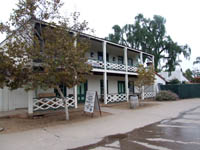
Robinson-Rose House
|
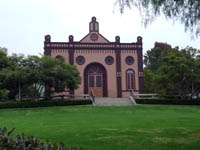
Old Temple Beth Israel |
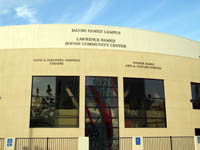
Lawrence Family JCC |
Editor's Note: We are reprinting news articles that appeared in back issues of various San Diego Jewish newspapers. You may access an index of the headlines of those articles by clicking here. You may also use the Google search program on our home page or on the headline index page to search for keywords or names.
Pioneer Women
From Southwestern Jewish Press, June 12, 1947, page 6
At the regular meeting held Thursday, June 6th, a letter just received from the national Moatzath Hapoaloth chairman was read in which she stated that while one commission after another is being set up to investigate Palestine, quote, “In Palestine itself our women are continuing to build, curfews and martial law notwithstanding. They continue to integrate the new arrivals into the structure of their homeland; they continue to train and rehabilitate youth, women and children; they continue to build new homes so that more children can be housed.”
For these vital reasons, we are bent on making this year’s Donor Dinner and Tenth Anniversary celebration an unprecedented success. Thos those chaveras who have not yet received a book of tickets, please call Woodcrest 5737 and we will be happy to take care of your requirements.
Our child Rescue Fund chairman, Chavera Clara Rasnick, has good reason to be elated as we have just sent a sizable check to New York for this project which she has promoted and supported so arduously since accepting this office.
An Oneg Shabbat will be held at the home of Chavera Eleanor Gordon, 3913 Centre St., Saturday, June 14th, at 1 p.m. Please let us have a record attendance. It is sponsored for the sole benefit and pleasure of our members.
Birdie Stodel B.B.
From Southwestern Jewish Press, June 12, 1947, page 6
The Annual Convention of District No. 4 B’nai B’rith Women is scheduled to convene on Saturday, June 1eth in the Hotel Californian in Fresno. Birdie Stodel Chapter No. 92 has elected Lena Kimmel, Ruth Aronoff and Esther Schwartz, president of the chapter, as the official representatives to the forthcoming meeting.
According to Mrs. Schwartz, the convention will concern itself “with the vital problems of membership acquisition and retention as well as a review and analysis of B’nai B’rith’s eight point program of Post War Service and Rehabilitation.” The regular business sessions will be augmented by several special events featuring the guest appearance of prominent district and national leaders.
Of unusual interest is the visit of Mrs. Maurice Turner of Washington, D.C. Mrs. Turner, past president of the Women’s Supreme Council, will give a memorial tribute to the late Henry Monsky, who until his death on May 2nd, was International President of B’nai B’rith.
Nomination, election and installation of 1947-1948 officers will occupy the closing hours of the last day’s session. Climax of the convention will be the banquet honoring the newly installed officers.
J.C.S.C.
From Southwestern Jewish Press, June 12, 1947, page 7
A very interesting, timely and enlightening lecture was given to the members of the J.C.S.C. at its last meeting by Mr. Lou Stein, who spoke on Palestine and the United Nations.
Joe Werthem and Ziggie Kessler have been appointed to represent the Jewish Community Social Club at the Center Planning Committee.
Due to the marriage of Louise Jacobson, who is recording secretary for the club, Gerda Friend has volunteered to fill out the unexpired term of that office.
Congratulations and best wishes are bestowed upon Louis Jacobson and Bert Goldberg, who were married Saturday, June 7th, and to Beverly Stern and Don Goodwin, who were married on Sunday, June 8th.
Plans for the forthcoming picnic are in the making and will be discussed at the next meeting which will be held at the Temple Center tonight, June 12th, at 8:30 p.m. All are cordially invited ot attend the meeting and join in the refreshments and dancing which follow the meeting.
Gerald Schissell Elected To Office
From Southwestern Jewish Press, June 12, 1947, page 7
Gerald Schissell, an active student at Woodrow Wilson Junior High School, has been elected to serve as president of the incoming ninth grade class He will assume his office in September.
In addition to his regular school studies, Gerald carries a Journal paper route. He has been interested in extra-curricular activities, having held office in the Student Body in his 7th and 8th grades.
Gerald is the son of Mr. and Mrs. Lou Schissell of 4440 Menlo Avenue.
{Return to top}

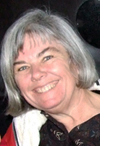 Nancy Harrison Nancy Harrison
cruise & tour specialist
(619) 265-0808

SAN DIEGO JEWISH WORLD THE WEEK IN REVIEW
Middle East
Sarkozy should butt out of Israel's affairs by Isaac Yetiv in La Jolla, California
Judaism
Midbar kvetching:complaints in the desert by Sheila Orysiek in San Diego
Adventures in San Diego Jewish History
—Honor Your Loved Ones On-line
—June 12, 1947: U.J.F. Announces Close of Campaign
—June 12, 1947: Telegram from Henry Morgenthau Jr. to Albert Hutler
—June 12, 1947: Admiral Badger Accepts Placque (sic)
The Arts
Cast of Morgan-Wixson's Cabaret weak by Cynthia Citron in Santa Monica, California
Lifestyles
Dancing their way through the senior years by Donald H. Harrison in Oceanside, California
Menus come on parchment in Dussini Mediterranean Bistro in the Gaslamp by Lynne Thrope in San Diego
Europe
Politics in jolly and not-so-jolly England by Lloyd Levy in Henley-on-Thames, England
Judaism
Why the soldier decided to wear his kippah by Rabbi Baruch Lederman in San Diego
The qualifications for being 'a good Jew' by Rabbi Leonard Rosenthal in San Diego
Adventures in San Diego Jewish History
Remember Your Loved Ones On-line
—May 29, 1947: Letter to the Editor {From Mike Lustig}
—May 29, 1947: We Were There by Albert Hutler
—May 29, 1947: Beth Jacob Congregation
The Arts
Golden Boy: New Village Art's golden oldie by Carol Davis in Carlsbad, California
A lesson in being true to one's real self by Donald H. Harrison in San Diego
Sports
A bissel sports trivia with Bruce Lowitt in Clearwater, Florida
Friday, June 27, 2008 (Vol. 2, No. 154)
Middle East
Parallels of German, Iraqi reconstructions by Shoshana Bryen in Washington D. C.
High school art project; Sderot twins illustrate Kassams' psychological impact by Ulla Hadar in Sderot, Israel
Lifestyles
Father and daughter both made some new friends on Single Parent Family Weekend by Gary Rotto in Angelus Oaks, California
San Diego County
Astronaut, centenarian address San Diego conference on aging and independence by Gerry Greber in San Diego
San Diego Jewish Trivia: Music by Evelyn Kooperman in San Diego
Adventures in San Diego Jewish History
Remember Your Loved Ones On-line
—May 22, 1947: Pioneer Women by Bess Borushek
—May 22, 1947: Eli Levenson Praises Chairmen In Making Final Welfare Fund Appeal
—May 22, 1947: Hillel Councilorship at State College a Possibility
The Arts
Chapter 14 of Reluctant Martyr, a serialized novel by Sheila Orysiek of San Diego
Middle East
Olmert, every crafty, may survive again by Ira Sharkansky in Jerusalem
The Arts
Debra Winger's memoir shows she can write as well as she can act by Yvonne Greenberg in La Jolla , California
Star Trek exhibit in San Diego provides Jewish visitors with reasons to kvell by Donald H. Harrison in San Diego
Temple Emanu-El and San Diego Musical Theatre are saying 'Bye, Bye ECPAC' by Carol Davis in El Cajon, California
Thursdays with the songs of Hal Wingard:
—No. 256, Youthful Love
—No. 215, Love Notes
—No. 104, Everything Is Sexual
Adventures in San Diego Jewish History
Remember Your Loved Ones On-line
—May 22, 1947: JWV Auxiliary
—May 22, 1947: Beth Jacob Congregation
—May 22, 1947: Jewish War Vets
—May 22, 1947: Lasker Lodge B.B.
Middle East
Are the French modern-day Delilahs? by Shoshana Bryen in Washington, D.C.
No time for electioneering, Israeli mayors in the Negev tell two Ehuds by Ulla Hadar in Sderot, Israel
Australia
A roundup of Australian stories by Garry Fabian:
—Long-running archives saga ends positively
—US academics travel 'Down Under'
—Refugee Week: time for reflection, action
—Church 'Middle-East statement' draws mixed reactions
—Melbourne Community-Victoria Police Dinner
—The environment and 'the Jewish question'
—Bipartisan politicians visit Jewish Holocaust Centre
—Canberra books a place in Jewish history
—Queensland Opposition Leader at AICC
—Perth Walks for JNF
—Can your boss make you work on Shabbat?
—Pratt steps down from Blues, but AJAX remains firm
—Chabad centre protested by neighbours
The Arts
Remember, a poem by Rebecca Rudin in San Diego
Cantor becomes a conductor—of a tour by Eileen Wingard in La Jolla, California
Adventures in San Diego Jewish History
Remember Your Loved Ones On-line
—May 22, 1947: That's What I Think by Ray Solomon
—May 22, 1947: S.O.S. Wants Books!
—May 22, 1947: Home Camp Registration Now Being Taken
—May 22, 1947: Rabbi Wolf to Speak For Sisterhood
The Arts
What You See Isn't Quite What You Get by Ronit Hakakha in Netanya, Israel
The awful revenge of a mediocre artist by Donald H. Harrison in San Diego
TICO builds reputation as soloist's haven by Eileen Wingard in San Diego
Adventures in San Diego Jewish History
Become a sponsor of the ‘Adventures’
—May 8, 1947: Victor Schulman Heads Allocations, Budget Committee
—May 8, 1947: Hadassah
—May 22, 1947: Flash! {Hillel}
—May 22, 1947: Women Raise Record Sum
Link to previous editions
< BACK TO TOP
|
|
